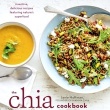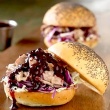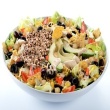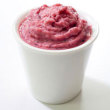SHANGHAI WALNUT CHICKEN
By Dana Jacobi for the American Institute for Cancer Research
The Secret of Hoison Sauce
At the Chinese take-out place I order from, my favorite dish is a colorful stir-fry combining chicken, red and green peppers and walnuts. It contains water chestnuts, too, but what I love most is the flavor of its brown sauce.
I was determined to find out how they make this just-right sauce, which is not too salty or too gloppy, and is just a bit sweet, with a gentle hit of heat at the end. With patience, I eventually managed to communicate my desire to learn how this sauce is made, and one day I was briskly motioned to come behind the counter and stand in the doorway to watch as a cook tossed together my order of Shanghai Chicken with Walnuts.
The secret of the sauce was revealed when the cook added hoisin sauce to the usual seasoning trio of soy sauce, vinegar, and roasted sesame oil. Sometimes called Chinese ketchup or barbecue sauce by Americans, hoisin contains fermented soybeans, garlic, wheat flour and sugar, plus other flavorings. According to Bruce Cost, an expert on Asian cooking, star anise is the reason for its distinctive, rounded sweetness.
Americans know hoisin sauce as the chocolate-colored, jam-thick condiment used on the pancakes served with Peking Duck. Incorrectly, some also call it barbecue sauce, although it is only one of a blend of ingredients Chinese cooks use for flavoring roasted meats and poultry.
Hoisin sauce is not commonly used in stir-frying. The cook who makes my favorite take-out stir-fry uses it because its unique flavor fits the Shanghai taste for dishes that are a touch sweet. It also adds body, so the sauce does not require the amount of cornstarch typically used.
It may seem tedious, but do take time to cut all the ingredients into small pieces that are even in size. This ensures that the ingredients cook quickly but evenly. If you can find them (most likely at Chinese markets), fresh water chestnuts have more crunch than the canned version.
SHANGHAI WALNUT CHICKEN
FOR THE SEASONING SAUCE:
2 Tbsp. Hoisin sauce
1 Tbsp. reduced sodium soy sauce
1 tsp. rice vinegar
1/4 cup fat-free, reduced-sodium chicken broth
1 Tbsp. cornstarch
FOR THE CHICKEN:
1/4 tsp. toasted sesame oil
1 Tbsp. peanut or canola oil, divided
3/4 lb. chicken cutlets, cut into 1/2-inch cubes
1 green bell pepper, cut in 1/2-inch dice
1 red bell pepper, cut in 1/2-inch dice
1 green chile pepper, thinly sliced
1 garlic clove, chopped
1 (8 oz.) can diced or sliced water chestnuts, rinsed and drained
1/4 cup coarsely chopped walnuts
In a small bowl, combine the hoisin sauce, soy sauce, vinegar, broth and cornstarch. Mix in the sesame oil. Set the seasoning sauce aside.
Set a wok or large frying pan over high heat. Drizzle in 2 teaspoons of the canola oil, swirling to coat the cooking surface. Stir-fry the chicken until it is white. Turn it out onto a plate.
Add the remaining oil to the pan. Stir-fry the green, red, and chile peppers, and the garlic, for 2 minutes.
Return the chicken to the pan. Add the water chestnuts and walnuts. Restir the seasoning sauce and add. Stir-fry until the chicken is cooked through.
Serve immediately, along with cooked rice, preferably brown rice.
Makes 4 servings
Per serving: 247 calories, 10 g. total fat (1 g. saturated fat), 17 g. carbohydrate, 22 g. protein, 5 g. dietary fiber, 378 mg. sodium.
By Dana Jacobi for the American Institute for Cancer Research
The Secret of Hoison Sauce
At the Chinese take-out place I order from, my favorite dish is a colorful stir-fry combining chicken, red and green peppers and walnuts. It contains water chestnuts, too, but what I love most is the flavor of its brown sauce.
I was determined to find out how they make this just-right sauce, which is not too salty or too gloppy, and is just a bit sweet, with a gentle hit of heat at the end. With patience, I eventually managed to communicate my desire to learn how this sauce is made, and one day I was briskly motioned to come behind the counter and stand in the doorway to watch as a cook tossed together my order of Shanghai Chicken with Walnuts.
The secret of the sauce was revealed when the cook added hoisin sauce to the usual seasoning trio of soy sauce, vinegar, and roasted sesame oil. Sometimes called Chinese ketchup or barbecue sauce by Americans, hoisin contains fermented soybeans, garlic, wheat flour and sugar, plus other flavorings. According to Bruce Cost, an expert on Asian cooking, star anise is the reason for its distinctive, rounded sweetness.
Americans know hoisin sauce as the chocolate-colored, jam-thick condiment used on the pancakes served with Peking Duck. Incorrectly, some also call it barbecue sauce, although it is only one of a blend of ingredients Chinese cooks use for flavoring roasted meats and poultry.
Hoisin sauce is not commonly used in stir-frying. The cook who makes my favorite take-out stir-fry uses it because its unique flavor fits the Shanghai taste for dishes that are a touch sweet. It also adds body, so the sauce does not require the amount of cornstarch typically used.
It may seem tedious, but do take time to cut all the ingredients into small pieces that are even in size. This ensures that the ingredients cook quickly but evenly. If you can find them (most likely at Chinese markets), fresh water chestnuts have more crunch than the canned version.
SHANGHAI WALNUT CHICKEN
FOR THE SEASONING SAUCE:
2 Tbsp. Hoisin sauce
1 Tbsp. reduced sodium soy sauce
1 tsp. rice vinegar
1/4 cup fat-free, reduced-sodium chicken broth
1 Tbsp. cornstarch
FOR THE CHICKEN:
1/4 tsp. toasted sesame oil
1 Tbsp. peanut or canola oil, divided
3/4 lb. chicken cutlets, cut into 1/2-inch cubes
1 green bell pepper, cut in 1/2-inch dice
1 red bell pepper, cut in 1/2-inch dice
1 green chile pepper, thinly sliced
1 garlic clove, chopped
1 (8 oz.) can diced or sliced water chestnuts, rinsed and drained
1/4 cup coarsely chopped walnuts
In a small bowl, combine the hoisin sauce, soy sauce, vinegar, broth and cornstarch. Mix in the sesame oil. Set the seasoning sauce aside.
Set a wok or large frying pan over high heat. Drizzle in 2 teaspoons of the canola oil, swirling to coat the cooking surface. Stir-fry the chicken until it is white. Turn it out onto a plate.
Add the remaining oil to the pan. Stir-fry the green, red, and chile peppers, and the garlic, for 2 minutes.
Return the chicken to the pan. Add the water chestnuts and walnuts. Restir the seasoning sauce and add. Stir-fry until the chicken is cooked through.
Serve immediately, along with cooked rice, preferably brown rice.
Makes 4 servings
Per serving: 247 calories, 10 g. total fat (1 g. saturated fat), 17 g. carbohydrate, 22 g. protein, 5 g. dietary fiber, 378 mg. sodium.
MsgID: 3136786
Shared by: Betsy at Recipelink.com
In reply to: RECIPE SWAP: Any Way You Like it Chicken...
Board: Daily Recipe Swap at Recipelink.com
Shared by: Betsy at Recipelink.com
In reply to: RECIPE SWAP: Any Way You Like it Chicken...
Board: Daily Recipe Swap at Recipelink.com
- Read Replies (25)
- Post Reply
- Post New
- Save to Recipe Box
ADVERTISEMENT
Random Recipes from:
Main Dishes - Chicken, Poultry
Main Dishes - Chicken, Poultry
- Easy Pickin' Chicken Pie (using cooked chicken)
- Curry-Coconut Chicken with Honey Mustard
- Campbell's Oven-Baked Bar-B-Q Chicken (using tomato soup)
- Calypso Chicken (Bisquick recipe)
- Dreamy Chicken Stew (using cream of chicken soup)
- Summer Italian Stuffed Chicken
- Tequila Lime Chicken (link)
- Sunday Dinner Roasted Chicken with Pan Gravy
- Pesto Chicken (whole chicken with red potatoes using an oven cooking bag)
- Strawberry Chicken (chicken breasts, cider, ginger, and fresh strawberries)
UPLOAD AN IMAGE
Allowed file types: .gif .png .jpg .jpeg
Allowed file types: .gif .png .jpg .jpeg
POST A REPLY
Post a Request - Answer a Question
Share a Recipe
Thank You To All Who Contribute
Post a Request - Answer a Question
Share a Recipe
Thank You To All Who Contribute
POST A NEW MESSAGE
Post a Request - Answer a Question
Share a Recipe
Thank You To All Who Contribute
Post a Request - Answer a Question
Share a Recipe
Thank You To All Who Contribute
































































